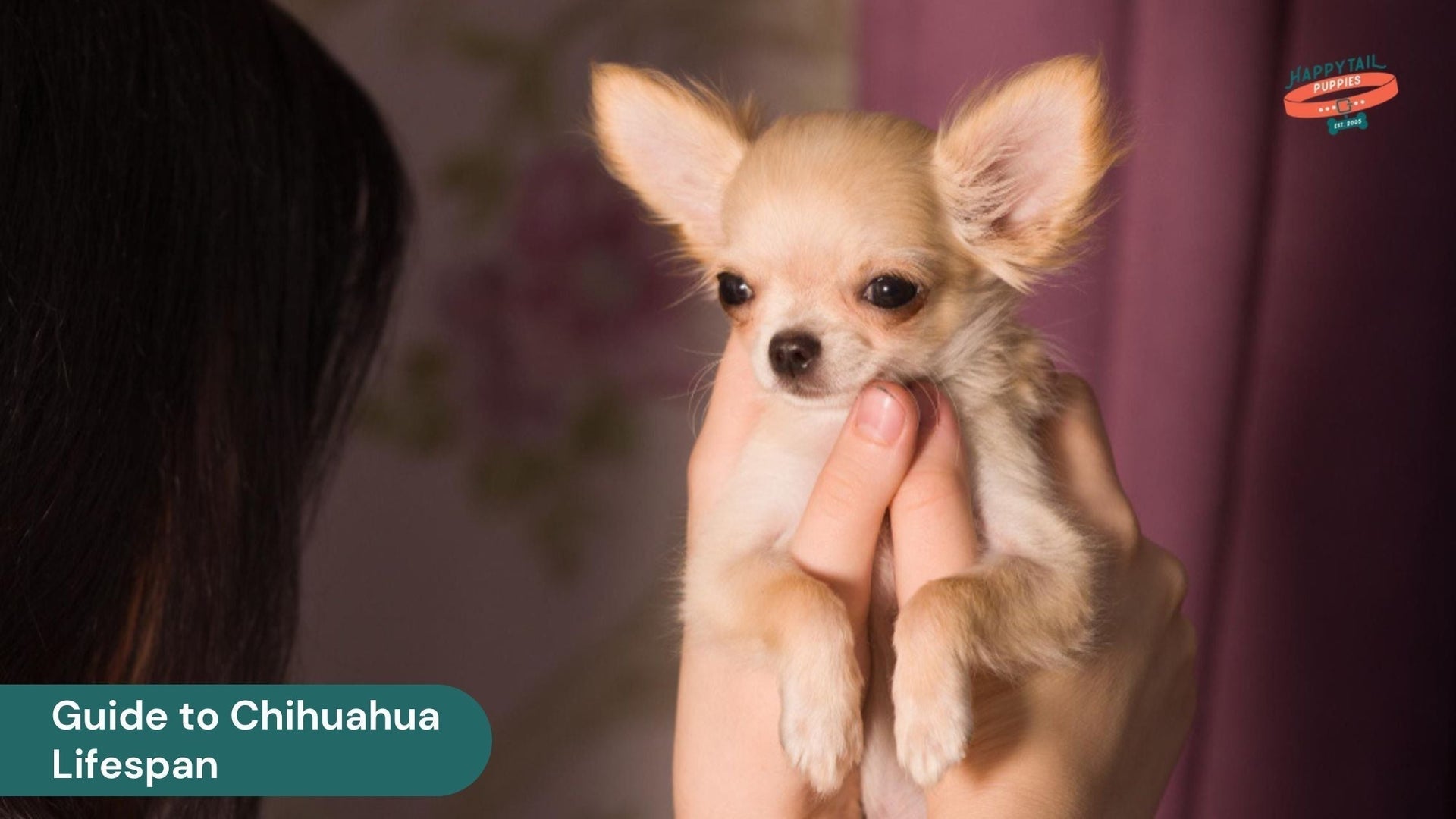The Complete Guide to Chihuahua Lifespan
Provide your loyal Chihuahua the best life! Learn the essential factors: diet, dental care, exercise, and genetics to ensure their health and happiness.
🐾Table of Contents
Chihuahuas are small, confident, and charming, and occupy a special place in the hearts of dog lovers. They are big personalities who are said to be incredibly loyal, even though they are very small. All pet owners would want to know the life of their pets so that they are able to give them the best care. Heredity, diet, physical activity, and lifestyle factors are all significant in the long life of these little friends. Let us find out what you should know about the Chihuahua Lifespan.
History and Origins of the Chihuahua
The Chihuahua dates back to ancient Mexico, so the breed is thought to have co-existed with the Toltec and Aztec civilizations. These little dogs were known as Techichi, and they were highly treasured as companions and were often depicted in carvings and relics as a symbol of faithfulness and help in the afterlife.
Studies conducted by the American Kennel Club (AKC) suggest that Chihuahuas became a breed during the early 20th century, and in a short period of time, they quickly became very popular in the United States because of their appeal and small size. The name of the breed was named after the Mexican state of Chihuahua, where the first explorers found the smallest representatives of this ancient breed of dogs.
The breed came to be popular globally, and with time, the other small breeds, including the Teacup Maltese, have been influenced by the breed, and possess the same traits of being elegant, loving, and enjoying company.
How Long Do Chihuahuas Live
Chihuahuas usually live between 12 and 20 years on average, hence it is said to be among the longest living dog breeds across the globe. Their longevity is a possible reason behind the small size and hard genetics, though the care and environment play a major role.
A study released by PetMD states that smaller dogs, such as Chihuahuas, usually have a longer lifespan than larger breeds as they age more slowly and are less susceptible to age-related diseases. They can greatly increase their lifespan and overall health through proper nutrition, exercise, and preventive veterinary care.
Owners who intend to bring a Teacup Chihuahua home must know that, although these small dogs live as long, they may require additional care due to their delicate size and sensitivity to health issues.
Factors That Influence a Chihuahua’s Lifespan
The more you know about what influences the life of your Chihuahua, the better choices you will make concerning their health and well-being. We are going to discuss the most critical aspects that determine the duration of your favorite pet's life and how you can enhance their quality of life.
Genetics and Breed Health
Genetics is a determinant in the life span of a Chihuahua. Purebred Chihuahuas tend to inherit both positive and negative health characteristics of their lineages. Responsible breeders can minimize the risk of heart murmurs, hydrocephalus, and dental problems as congenital diseases. A similar significance of genetic health is evident in other small dog breeds, such as the Yorkshire Terrier, where good breeding has a direct influence on longevity and vitality.
A Chihuahua with a healthy genetic background will have a significantly higher chance of living a long, healthy life. Through routine veterinary checkups and genetic testing, risks can be detected at an early stage, and the owner can control the health condition before it escalates.
Diet and Nutrition
One of the most important factors affecting longevity is nutrition. A balanced nutritional food, consisting of lean protein, antioxidants, and vital vitamins, aids in muscle growth, immunity, and energy. The relationship between diet and lifespan is apparent in small breeds, as observed in the Maltipoo. A regular diet and portion control are crucial for extending a Maltipoo's lifespan and promoting overall health.
Excessive eating or excessive treats may also result in obesity, which elevates the chances of diabetes and cardiovascular diseases. It is essential to monitor the portion of food intake and feed your pet high-quality food specifically designed for small breeds to ensure an ideal body size and optimal digestive health. To make the best dietary changes, always consult your veterinarian to ensure you are getting the best nutrition.
Exercise and Activity Levels
Even though chihuahuas are small, they possess a very high level of energy. The walks and indoor games they have every day ensure that they do not get obese and that their muscles are not too fat. The impact of daily exercise is evident in the lives of other small dog breeds, such as the Mini Goldendoodle lifespan, through regular exercise. These daily routines help Chihuahuas stay fit, less stressed, and healthier, both physically and mentally.
They also have interactive toys that challenge their minds and prevent boredom. Regular physical exercise promotes heart and mood health. Active Chihuahuas tend to experience fewer behavioral issues and have longer, healthier lives full of energy.
Veterinary Care and Preventive Health
Regular vet check-ups are essential in the detection of early signs of diseases. Vaccinations, deworming, and dental cleaning are used as preventive measures to prevent future complications. Based on statistics provided by the American Veterinary Medical Association (AVMA), the lifespan of a dog can be increased up to 20 years through preventive treatment and early diagnoses, which underlines the value of regular medical examinations and wellness courses.
Dental health is essential, as improper oral hygiene can lead to heart and kidney infections. An annual check-up would keep your Chihuahua in good health. Regular check-ups will enable the veterinarian to adjust feeding and medication according to your pet's specific needs.
Dental Care and Oral Health
The Chihuahuas are also vulnerable to dental issues because of their small mouths and overcrowded teeth. Tartar and gum disease can also lead to tooth loss easily if left untreated. Regular brushing, using chew toys, and having professional cleanings are some of the Dog Dental Care Tips that would keep their teeth and gums healthy throughout their life.
Severe gum diseases are also prevented by professional dental cleanings once or twice a year. Good, healthy teeth and a clean mouth will help your pet live longer and be less likely to be infected systemically through the mouth.
Environment and Safety
The life of your Chihuahua can be significantly influenced by the environment in which it lives. Extreme temperatures, exposure to hazardous objects, or ingestion of poisonous food can lead to severe health problems. Providing a secure and hygienic environment for your pet creates long-term peace of mind.
Having your Chihuahua spend most of its time indoors and giving them a nice place to sleep makes them feel safe. By not exposing them to hard weather conditions like cold or very hot weather, they will avoid respiratory and heat-related issues.
Training and Mental Stimulation
The mind is a factor that fosters longevity. Chihuahuas are smart dogs and like to learn tricks and commands. Pet owners searching for the cost of a teacup chihuahua can sometimes find out that spending money on proper training and enrichment activities not only makes their dog happier but also improves their health.
Interesting them in puzzle toys or brief training sessions will ensure that their minds are not idle and that they do not get anxious. An intelligent Chihuahua is happier and more confident. Emotional stability lessens stress-related health complications and enables your pet to grow old and lead a better life.
Health Problems That Can Affect Lifespan
Each type of dog breed is associated with a specific number of health issues, and Chihuahuas are no exception. Early detection and treatment of these conditions can contribute to prolonging their lives and maintaining their health.
Heart Disease
Older Chihuahuas are prone to heart issues, especially conditions such as mitral valve disease. The condition may lead to fatigue, coughing, and low energy. Symptoms can be treated through regular cardiac check-ups and a balanced diet.
The Journal of Veterinary Internal Medicine (JVIM) data indicate that mitral valve disease is responsible for nearly 75 percent of all heart disease cases in small dog breeds, which makes early screening and frequent heart checks a critical issue. The importance of veterinary monitoring emerges when the initial symptoms can be observed, and proper medication will prolong the life of your dog and ensure the quality of life.
Obesity and Weight Management
One of the most preventable conditions in Chihuahuas is obesity. Overweight is a burden to the joints, increases the risk of heart disease, and is a contributor to diabetes. Portion control and daily exercise are effective ways to combat this problem.
A healthy weight guarantees increased mobility and energy. It also helps keep your pet's joints healthy, allowing them to stay active even in their senior years.
Respiratory Issues
Chihuahuas are small and characterized by a delicate structure; hence, they may experience breathing problems, especially in hot or humid weather. Being kept in a well-ventilated area and not overexerting is beneficial for maintaining a healthy respiratory system.
It is important to keep an eye on your pet and watch out if it is coughing or breathing fast. Minor problems can be prevented by attending the veterinarian as soon as possible to avoid the development of respiratory problems into chronic ones.
Dental Disease
Dental problems are prevalent but are not taken seriously. Gum infections and tooth decay can cause severe complications if left untreated. The most effective prevention is regular brushing and regular dental checkups.
Healthy teeth can not only enhance the digestion and the chewing process but also prevent the spread of bacteria in the blood. Regular dental maintenance can significantly extend the lifespan of a Chihuahua.
Joint and Bone Conditions
Chihuahuas are also susceptible to patellar luxation, a disorder in which the kneecap is displaced. This can lead to limping or walking difficulties, especially among older dogs. Light exercise and good weight will prevent stress on the joints.
According to data provided by the American Kennel Club Canine Health Foundation (AKCCHF), up to a quarter of small dog breeds can develop some type of joint or bone disorder throughout their lives, which supports the need for diagnosis and appropriate treatment at an early stage. Regular vet visits will help diagnose the disease early and ensure it is managed correctly. Glucosamine and omega-3 fatty acid supplements may be used to support joint health and enhance mobility.
Tips to Extend Your Chihuahua’s Lifespan
All Chihuahua need to have a long, healthy, and happy life. When properly taken care of, you will see your furry friend live a long and happy life with you.
Provide a Balanced Diet
Nutrient-dense and high-quality food that suits the small breeds will guarantee that your Chihuahua is getting the appropriate proportions of protein, fats, and vitamins. Table scraps and processed foods should be avoided, as this can upset their digestive system. Regular feeding and adequate hydration contribute to overall health and a longer lifespan.
Maintain Regular Exercise
Chihuahuas do not need a lot of space, as they all need physical activity on a daily basis. Short walks, fetching sessions, and indoor play time help to work the muscles and keep them alert in mind. Exercise assists in weight control and the prevention of sedentary-related diseases.
Ensure Mental Enrichment
Chihuahuas are fond of intellectual problems. Bring in toys, puzzles, and a little obedience training to keep their minds sharp. Constant communication will avoid boredom and enhance mood. Mental health is directly related to physical health, and enrichment is a major component of the treatment process.
Prefer Vet Check-Ups
Vet checkups should be carried out regularly to detect and prevent early diseases. Every Chihuahua should be vaccinated, treated for parasites, and properly cared for. Not only do these visits prolong life, but they also ensure comfort and health in later years.
Conclusion
Chihuahuas are small animals, but they bring warmth and love to their homes. They have the longest lifespan in the canine world, which is an indicator of their strength and the attention they receive. With proper diet, exercise, and good veterinary services, you can provide your Chihuahua with the long, healthy life he or she needs. You must enjoy every moment of your life with your faithful friend and appreciate the beauty of a well-traveled life together.


